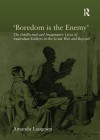Written by: Amanda Laugesen
Ashgate, Farnham (United Kingdom), 2012, 310 pp,
ISBN 9781409427322
Reviewed by: Dr Craig Wilcox, freelance historian, Sydney
‘I’ve been reading a little, the first book for many, many months, and I cannot settle to it,’ admitted Eric Evans of the Australian Imperial Force’s 13th Battalion in 1917. He confessed the reason to his diary: ‘my mind has been persistently on the topic of women, women, women’.
What exactly was Evans trying to read when finding himself so sorely distracted? What books did he and other members of Australia’s masculine, infantry-based expeditionary forces of the twentieth century turn to, if restlessly and briefly, in precious, private moments out of the firing line and off fatigue duty? What comedians made them laugh, what films made them cry, and what songs did they sing among themselves? Questions like these prompted this brilliantly conceived, carefully researched and clearly written book by Amanda Laugesen, a cultural historian at the Australian National University.
Laugesen aims at a collective portrait of a military audience, of its tastes and inclinations, perhaps even of its inner life. The result is necessarily more of a sketch than finished painting. The providers of cultural entertainment had plenty of reasons to leave records behind of books they mailed to a battalion, or skits worked up into a revue. Soldiers, on the other hand, had little reason and less time to write down what they made of it all. Laugesen’s sketch is revealing nonetheless.
The effort to provide Australian’s soldiers during the world wars with more wholesome pastimes than grumbling, gambling and whoring mobilised government, charities and families. Books and magazines jostled with jam tins and socks in the millions of boxes of ‘comforts’ mailed to the troops. Screens and projectors rattled in the backs of army trucks bringing the latest newsreels and films to the front line. Comedians and singers went on arduous and sometimes dangerous tours. By the early 1940s radio programs were beaming current news, cultural discussions and live performances across northern Australia and into New Guinea.
Much of this vast collective effort aimed to improve the morals, intelligence and even politics of a captive mass audience. Bibles and literary novels arrived with detective stories and westerns; Mozart and Ravel were endorsed in earnest radio broadcasts as superior to popular music. Was this cultural conservatism, as a jazz-loving signaller complained during the Second World War, ‘the very thing we are fighting against’ in going to war with Nazi Germany and Imperial Japan? Government efforts to distribute books on current affairs, along with the unstuffy army magazine Salt, were anything but conservative, hoping to mould readers into more sceptically patriotic citizens by the time peace came.
A returning prisoner of war jokingly warned his family that ‘You will find I am almost a cultivated man’. Yet as Laugeson tells us, many soldiers resisted cultivation. ‘Call that a library?’ one scoffed at a collection of books on the ship carrying him to the First World War. ‘Why, there ain’t one o’ Nat Gould’s or Charles Garvice’s in the whole show!’ Bestselling writers like Gould and Garvis are forgotten today, but they were firm friends to troops who simply wanted a daydream in print. So was the New Testament, especially when it was a gift from a mother or girlfriend. Equally prized were local newspapers and letters from home. Films were not as popular as we might expect, though much depended on plot and cast. For all their popularity on the home front, movies like London Can Take It annoyed men who were taking it themselves. Tough-guys like Humphrey Bogart and James Cagney seemed fake to viewers who really did shoot their enemies, and who knew that no one dies the discreet death of the Hollywood extra on the losing side of a gunfight.
Laugeson’s final chapter leaves the World Wars behind to glance briefly at Vietnam and suggest how her audience and its cultural providers changed after 1945. The effort at uplift largely vanished. Serious reading became rare, comedians and musicians tended to be superannuated bores and provincial copycats, and pornography was no longer confined to a few lurid postcards—a modern Eric Evans no longer had to put aside a magazine to ponder women. Film and music were freed up by the ‘60s to evoke and stoke the doubts some troops felt about their war. ‘James Stewart says some good things,’ one soldier wrote home after watching Shenandoah. ‘War is great. The undertakers make the most of it. The politicians know the rights of it, the officers know the glory of it and the soldiers just want to go home.’

